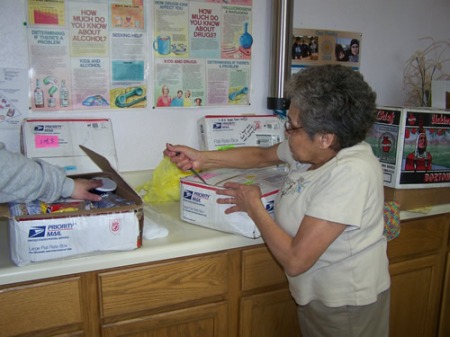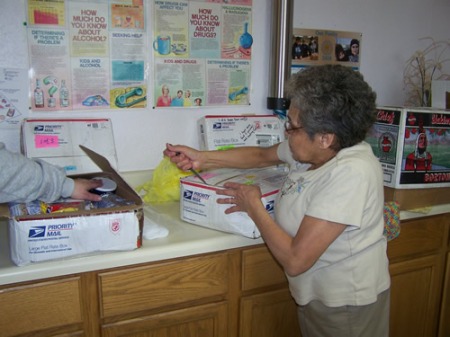Feb 28, 2009
Editor’s Note: The following is an article that will soon be submitted to the The Alaska Dispatch on behalf of Nunam Iqua, Ugashik and Pilot Point by our friends Victoria Briggs and AnnS. Much of what we’ve been tossing around here is addressed in the letter. Please chime in!
 Pilot Point Tribal Council President Sophie opening boxes
Pilot Point Tribal Council President Sophie opening boxes
Greetings Alaska Dispatch Readers;
This is a joint letter from Victoria Briggs of Ugashik and AnnS of Nunam Iqua. Both of us have been actively advocating to help our villages through these tough times. We are both currently working on Food Drives, bringing in food and supplies to our needy families.
We are sure that everyone reading this already knows of the Crisis in Rural Alaska, which came to light starting with a letter written by Nicholas Tucker of Emmonak back in mid-January. Since that time there have been many letters and articles discussing this Crisis.
Both of us, Victoria and Ann, feel that we are slowly meeting the “short term” goal of making certain our villagers are fed and warm this winter. Now it is time to start looking towards preventing this type of crisis from occurring in the future.
While we have been working on our food drives we have also been working with a lot of people on a website called Anonymous Bloggers.com. This website was created by a woman in Florida that is completely devoted to addressing the issues of rural Alaska.
In all the help that our villages have received we want to make sure we thank those that helped us find our ‘voices’ to bring the crisis of Rural Alaska to light and hopefully towards finding long term solutions.
Those that first helped get the attention brought to the plight of our villages will forever be first in our hearts and minds when we think of this entire issue!
Here is a brief synopsis of what we are looking at and discussing in way of long term solutions to this crisis in not only Ugashik and Nunam Iqua but also across ALL of Rural Alaska:
The “Long Term” Discussion
In an attempt to be part of the LONG TERM solution that allows our villages to travel into the future with dignity, we are going to open a discussion on the villages and our hopes for them.
We might be chastised, like many before us, but we are hoping that instead those whose hearts are in the right place are recognized and that we can have an open discussion. We are going to approach this, hopefully, without name calling but instead with calls for accountability of those that are there to ‘help’ us.
An article was written, we feel fairly and with insight, by Elise Sereni Patkotak, for the Alaska Dispatch.
We would like to use this as a jumping off point to present some of the ideas we have that might be a start for our villages to work their way out of these issues.
We also recognize that economic development goes hand in hand with community development. Our villages have a great need for community development; roads, better/longer airstrips, docks, school buildings, water and sewers etc.
We also realize we can do some economic development to help justify the community development and not just wait for the investment in our villages.
We can invest in ourselves!
We can develop those resources we have while we weave our way into self sustainability. (some of this will raise questions as we use very Alaskan terms and discuss issues that are ‘normal’ to us – please feel free to question. In your asking us to explain many times we learn more of how things work or take care of misinformation that even we might have)
Here are just a few of the ideas we have, and welcome input on all parts of these:
* First of all, work with our villagers to realize our rights to hold the local and regional governing groups accountable for their actions. As many groups have learned over the year that an informed voter is a better group for all. We must work with many on this so we can effectively ask for the changes that are needed.
*Find out what rights we have to vote for tribal officers, see the activities they participate in, and to have them report back to us on their activities. What rights do we have to see our village tribal budget and accounts? To get a report of the grant monies and how they are spent? Find out what ‘rights’ we have to hold our local for profits accountable and then also our regional for profits.
*Educate our villagers on these rights.
* Do the same for CDQ (Community Development Quota) board members and involve ourselves in their operations.
* Build better markets for our Yukon Keta (Chum) Salmon so as to have a two prong income for our fishermen and families. For Bristol Bay villages building awareness of Sockeye Salmon is also needed. (This can be done in conjunction with other groups and simply by talking about it every chance we can)
* Organize and join forces with all western villages on the issues of by-catch of our Chinook and other salmon by trawlers. We can not wait for an outside group to set these rules; we must DEMAND them for the strength of ALL fisheries in Alaska. We must demand our CDQ groups, who are also trawler owners, guard these also for us to protect not only our commercial fishermen but also our subsistence rights. Both go hand in hand with our ability to develop and maintain sustainable communities.
* Become more involved in how the limits and seasons are set for our subsistence hunting and fishing. Understand the biology behind the limits and work with the area biologists to support both the outside hunting but also our right to have a source of subsistence food to support our families.
*Get our resident members onto advisory boards and actively into this process. Demand the state follow their regulations on the issues of advisory boards so our voices will be heard.
* Pursue the opportunity for a locally formed fishermen’s co-op, village tribe and private company to form a larger processing operation that will be located in our fishing district. (this is specifically for the Alaska Peninsula villages as they are working toward this.)
* Establish a system or way to get some grocery stores into our villages that don’t have them, such Nunam Iqua and Pilot Point.
* Pursue ways to capitalize on any local resources such as naturally grown berries to supply outside markets. Also to possibly establish a village based, small, “community kitchen” to supply traditional foods to other Natives who do not have a resource. This might work well for those who live in larger areas where subsistence activities are not allowed but for someone that wants to maintain a traditional lifestyle.
* Possibly start showcasing, mostly likely via the web, some of our crafts, traditions and artists. In time offer some items for sale.
* Start the conversation on what might be of interest to the science community in the areas of climate changes, summer bird populations and animal habits. Possibly fostering studying of these and form a base in our area for this type of research.
* Figure out how to grow more of our own food locally so we do not have to import so much.
* Make sure ALL of our residents have the needed skills to put up food reserves from the summer harvests to better sustain them in the winter months.
Much has been happening so far, like getting wind and other sources of energy planned, but we need to also start things in the villages themselves.
Check out the different links on the website we have set up for discussion and join forces with us to come up with some long term solutions. You’ll find us at anonymousbloggers.wordpress.com There are MANY pages there on not only these topics of long term goals but also updates from both of us on our food drives and information on how to help.
So please consider this a formal OPEN invitation to help us help not only our villages but villages across Rural Alaska. We look forward to and value your input,
Sincerely,
Victoria and AnnS







